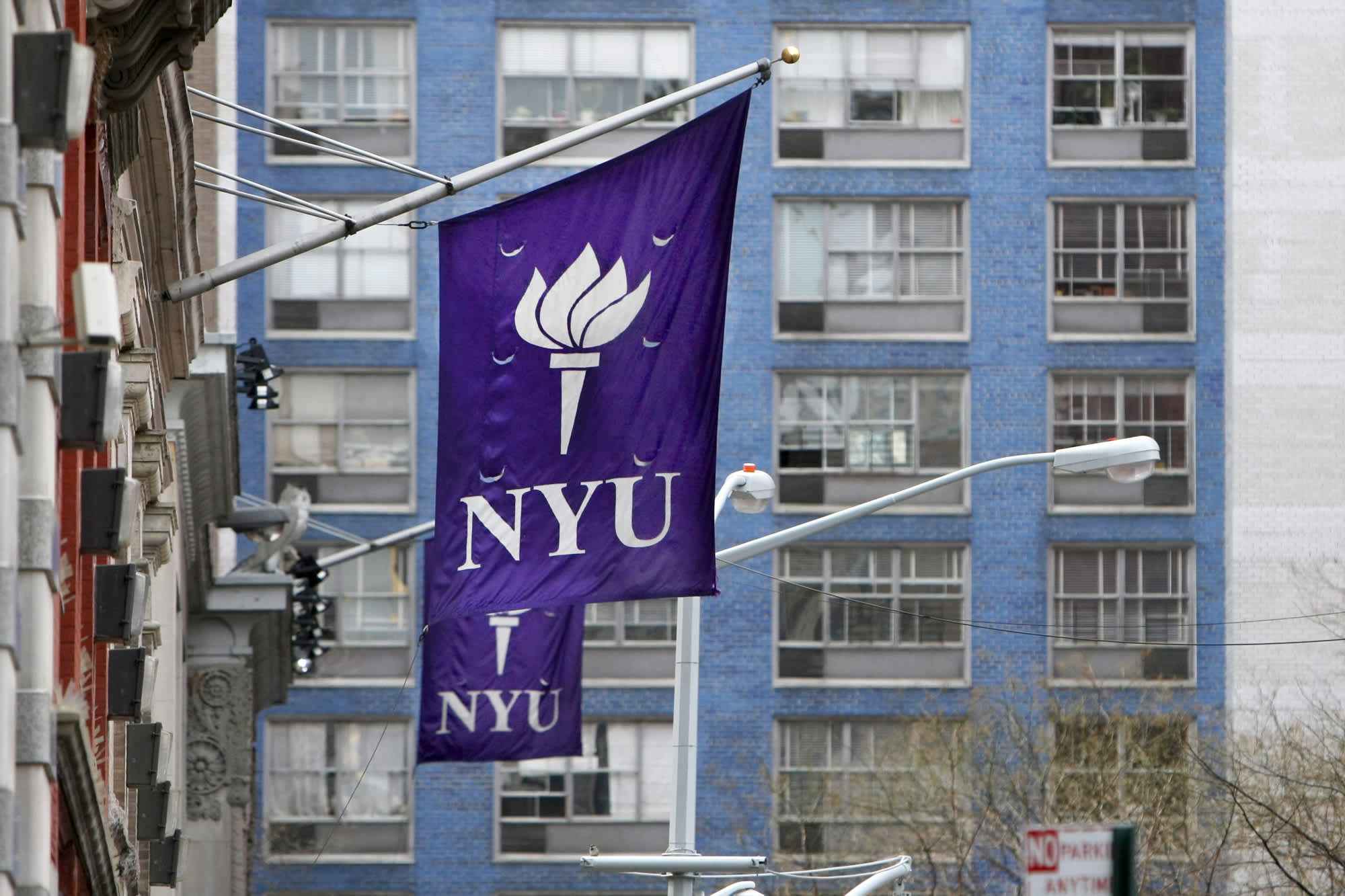Information System Leaders, and More – New York News

Let’s explore some of the most interesting stories that have emerged from New York business schools this week.
Teaching Creativity, Strategy to Tomorrow’s Information Systems Leaders – Stevens Institute of Technology School of Business Blog
The Stevens Institute of Technology SOB spotlighted assistant professor of Information Systems Dr. Aron Lindberg, whose Digital Innovation course is a cornerstone of the master’s program in Information Systems.
Dr. Lindberg writes, “Digital products and processes are central to what businesses do today. And information systems professionals need to participate in the process of creating those products and services, and continuously pushing the envelope in search of innovation.”
He adds, “With all the data available today, you need the scientific method to ensure you’re doing your analysis in ways that are reliable and valid. Otherwise, you are not going to make good business decisions.”
Information Systems Master’s Program Director Dr. Paul Rohmeyer lauded Dr. Lindberg’s course, which “blends technical, management, strategy and entrepreneurship components, and presents them in an environment much like where they’ll work once they graduate.”
You can read the full article here.
NYU Stern Congratulates Paul Romer on Winning the 2018 Nobel Prize in Economics – NYU Stern
NYU Stern’s Paul Romer was recently awarded the 2018 Nobel Prize in Economics “for integrating technological innovations into long-run macroeconomic analysis.”
Romer has conducted “applied research on the many ways that policymakers in the developing world can use the growth of cities to create economic opportunity and pursue social reform” as part of the NYU Stern Urbanization Project, which he also founded.
Romer also directs the Marron Institute of Urban Management, which “deepens the fundamental understanding of cities by working with civic innovators to improve urban management.”
You can read the full release from NYU here.
Talking with … Albert Greco – Gabelli Connect
Gabelli School of Business‘ “Talking with …” feature recently spotlighted professor of marketing Albert Greco who is currently researching a business history book about the post-1980 U.S. trade book business and has a business history book proposal under review about the marketing and financing of World War II in the U.S.
Greco discussed what interests him most about teaching consumer behavior, which he has analyzed in some shape or form since 1985.
“Consumer behavior looks at great questions and issues related to who, what, when, where, how, and why consumers decide to buy, or not buy, products and services. This means analyzing issues related to age, gender, style, prestige, the channels of distribution, etc.”
Greco also talked about issues related to university presses, which he described as “critical to the intellectual life of universities and academics, but many of them are small to medium-sized undercapitalized presses, and they need to address costly back-office operations and scale issues.”
You can read more from the interview here.
NYU Stern and Yale SOM Professors Awarded Nobel Prize in Economics

Faculty define a business school. Their research, teaching, mentorship, and influence have tremendous impact on the experience students have while there and often the careers they pursue once they graduate. From the curriculum they shape to the initiatives and centers they help run, faculty are vital. And it certainly never hurts when those faculty are also Nobel Prize winners.
This year, professors at two leading business schools were recognized with the 2018 Nobel Prize in Economic Sciences: Paul Romer at NYU Stern School of Business and William Nordhaus of Yale School of Management (SOM).
Nobel Prize Winners in Economics
At first glance, Romer and Nordhaus might seem unrelated. Romer has spent his career focusing on the nature of economic growth, seeking to answer the burning question, “Why do economies grow and how?” Nordhaus’ work, on the other hand, dives deep into the economic costs of environmental damage in an effort to gauge how much society would be willing to pay to avert climate change.
And yet both men have been hailed by Sveriges Riksbank, which awards the economics prize, as individuals known for “integrating innovation and climate with economic growth,” The Economist reports. They have also both influenced the way other economists think about critically important and complex systems.
Paul Romer
Paul Romer joined NYU Stern in 2010. Currently on leave, Romer is best known for founding the NYU Stern Urbanization Project in 2011, which conducts applied research on how policymakers in the developing world can use city growth to create economic opportunity and enact social reform.
In economics, Romer is known for developing the “endogenous growth model” and other approaches for spurring the market to generate new ideas. These models are based on the belief that the pace of growth and ways in which ideas are translated into growth depends on factors such as state support for research and development of intellectual-property protections. Hailed as a critical step toward understanding patterns of economic growth across the globe, his models highlight that the creation and spread of ideas is necessary for growth, but not alone adequate for initiating it.
In awarding Romer with the Nobel Price in Economics Sciences, the Swedish Academy cited his influence on “integrating technological innovations into long-run macroeconomic analysis.” (NYU Stern News)
William Nordhaus

Photography ©Mara Lavitt October 8, 2018 Evans Hall, Yale School of Management, 165 Whitney Ave. New Haven Yale University press conference presenting William Nordhaus, the Sterling Professor of Economics at Yale University. Nordhaus was awarded the 2018 Sveriges Riksbank Prize in Economic Sciences in Memory of Alfred Nobel.
Yale SOM Professor William Nordhaus has significantly impacted the teaching of economics at the school. A few years ago, he chaired the Yale Carbon Task Force, which looked at the market price of carbon-related products to determine the need for a market correction due to over-consumption or potential externalities. In particular, the task force delved into questions about distributing costs through organizations, tax effects of corrections, and connectivity problems and solutions.
As a professor, Nordhaus is best known for connecting people with important issues. He asks tough questions that make economics more accessible for everyday people and policymakers.
In economics specifically, he is best known for tackling complex systems surrounding climate change. His research has examined the economic costs of environmental damage and how much society would be willing to pay to avert them. As part of his work, he has combined mathematical descriptions of emissions with integrated assessment models, allowing him to project the impact of different global carbon emissions trajectories on global temperatures.
In awarding him the Nobel Prize in Economics, the Swedish Academy praised his work for “integrating climate change into long-run macroeconomic analysis.” (Yale SOM News)
Changing the Face of Economics
In the end, there’s no denying that both Romer and Nordhaus have blazed new trails in economics and humanity. Their names are synonymous with grappling with global issues we can’t afford not to understand.
This article on Nobel Prize winners has been edited and republished with permissions from Clear Admit.
Which Business School Students Have the Top GMAT Scores?

A strong GMAT score is essential to a stellar business school application. Though the score is universally important to admission, certain schools emphasize a high score on the test more than others. Below, we’ve laid out a list of the 10 business schools with the top GMAT scores for incoming students.
Forbes, Statista Analyze The Best U.S. Employers for Women

Forbes, in partnership with German data company Statista, surveyed over 40,000 U.S. employees (including 25,000 women) that worked for companies that had at least 1,000 total employees in an effort to find which companies were the best US employers for women. While several big-name companies earned high marks, one particular Iowa-based company managed to stand out among the competition.
The first set of criteria Forbes and Statista analyzed to calculate its best US employers for women ranking centered around factors such as working conditions, diversity, and “how likely they’d be to recommend their employer to others.” When accounting for the men in the survey, in contrast to the women that were asked the same set of questions, scores were adjusted if the differences if answers became apparent. For example, Statista would adjust scores if men in the survey said a company had a lot of diversity, but women said that the same company did not.
The following set of criteria used in the survey, specifically for the female respondents, focused on “on factors such as parental leave, discrimination, and pay equity,” as well as nominated companies outside of the one they happen to work for. “The final list ranks the 300 employers that both received the most recommendations and boast the most gender diverse boards and executive ranks,” Forbes says.

Des Moines, Iowa company Principal Financial Group was the best U.S. company for women, according to Statista data.
Principal Financial Group, based out of Des Moines, Iowa, earned the highest honors for the 2018 ranking, with an official score of 91.4. The company, ranked 210th overall on the Fortune 500 list, employs 9,978 U.S. workers, nearly 60 percent of which are women. Speaking with Forbes, Kerry Gumm, the Principal Capital Director of Human Resources Strategy, says, “It really does start with the culture of the organization.”
“You can have a holistic life if you’re part of this organization,” she adds. “I’ve not felt the need to compromise in any way.”
Principal Financial Group earned high recommendations because of its benefits, which include “flexible work schedules, prenatal care programs, and an onsite childcare center.” The company also manages an annual review of all of its pay practices to better combat any potential biases, alongside an anonymous call center to help discuss compensation disputes. Not to be outdone, the company also implements rigorous standards in helping its own employees earn promotions, of which include “three women’s networks for those in leadership, technology, and sales roles.” In contrast to many of the companies listed in the aforementioned Fortune 500 listing, 42 percent of executive roles and 45 percent of the boards seats are held by women Principal Capital Group.
The University of Pennsylvania Health System, more commonly referred to as Penn Medicine, earned the number two spot on the ranking. The organization has over 35,000 U.S. employees; the third highest among the top ten ranked companies. With a significantly larger employee base than Principal Financial, Penn Medicine also has one of the largest percentages of female employees in the country at 77 percent. This also includes 55 percent women in the organization’s executive roles, as well as five out of its seven CEOs.
Card manufacturer Hallmark, based in Kansas City, Missouri, rounded out the top three. The company sports the smallest employee base out of any company in the top 10, with 2,500 U.S. employees. However, Hallmark featured an even larger portion of U.S. female employees than Penn Medicine, with a figure of 83 percent overall. About 70 percent of the Hallmark board is also held by women.
Several of the nation’s most prominent universities also managed to land in the top 50 of the new ranking, the highest of which was Harvard University at 9th overall. New York University, UVA, Stanford, and Emory University also earned high honors in the 2018 best US employers for women ranking.
2018 Best US Employers for Women
| Ranking | Company | # of U.S. Employees |
|---|---|---|
| 1 | Principal Financial Group | 9,978 |
| 2 | Penn Medicine | 35,273 |
| 3 | Hallmark | 2,500 |
| 4 | BayCare | 25,600 |
| 5 | Oregon Health & Science University | 15,642 |
| 6 | Keller Williams Realty | 154,000 |
| 7 | Boston Children's Hospital | 5,001 |
| 8 | Providence Health & Services | 82,000 |
| 9 | Harvard University | 18,724 |
| 10 | Gwinnett County Public Schools | 23,300 |
Click here to see the 2018 entire ranking.
Top Business Schools Respond to Repeal of Diversity Guidelines

Diversity in the college admissions process was dealt a blow in early July when the Trump administration withdrew a guidance that encouraged affirmative action in regards to enrollment. The move was announced when the departments of Justice and Education retracted several letters and memos that advised schools on how they could consider diversity in admissions and other various decisions. Continue reading…
GMAT Scores, International Students Jump at NYU Stern

Last week, the NYU Stern School of Business shared a preliminary profile of its Class of 2020. Even amid some declines, the school showed gains in the diversity of its class and added a few points to the average GMAT score for incoming students.
This year saw 3,781 applicants—down from 3,927 for the Class of 2019. Among the new applicants, 876 were admitted (23 percent) and a total of 375 enrolled. Last year, 822 applicants were admitted (21 percent), yielding 402 enrolled students.
Although the percentage of female students dropped slightly from the previous year (38 to 35 percent), the Class of 2020 is more global than the Class of 2019. International students increased from 37 percent last year to 39 percent, even as overall international MBA application volume to U.S. schools faltered.
“International applications were down about 10 percent this year, but they still represent about half of total applications, so we had a very strong pool of applications from which to admit,” an NYU spokesperson says.
The percentage of minority students held steady at 29 percent—the same as the previous year. But of those, 13 percent this year are underrepresented minorities (U.S. citizens and permanent residents who identify as African American/Black, Hispanic, or Native American/Alaskan Native), up 2 percentage points over the Class of 2019.
The average GMAT score for incoming students this year increased to 717—a three-point gain over the previous class. However, the median GMAT maintained the same score as the previous class, sitting at 720. At the same time, applicants opting to submit GRE scores instead of GMAT scores jumped from 12 to 19 percent, while the average GPA slipped slightly from 3.48 to 3.45.

The NYU Stern Class of 2020 sported a 717 GMAT average; three points higher than the previous class.
The Class of 2020 has a diverse educational background. Approximately 29 percent of students studied business as undergrads, more than any other major. Another 20 percent of the incoming class have degrees in engineering, math, and science. Economics, humanities, and social sciences majors make up the rest of the class, totaling 18 percent, 17 percent, and 16 percent, respectively.
Stern also continued its efforts to recruit military veterans and active duty service members, including through the Fertitta Veterans Program. Now in its second year, the program underwrites more than half of the tuition bill for approximately 20 incoming students annually. Veterans and active duty service members comprise 7 percent of the Class of 2020, similar to last year.
The average work experience among incoming students increased from 4.9 years for the Class of 2019 to to 5.3 years this year. More than a quarter—26 percent—of the Class of 2020 comes in with previous experience working in financial services, and another 13 percent come from consulting. The three next largest feeder industries are technology, entertainment/media, and military/government, making up 9 percent, 7 percent, and 7 percent, respectively. With regard to post-MBA career aspirations, members of the Class of 2020 are increasingly interested in consulting, technology, entrepreneurship, and healthcare.
Click here or more information on the NYU Stern Class of 2020.
